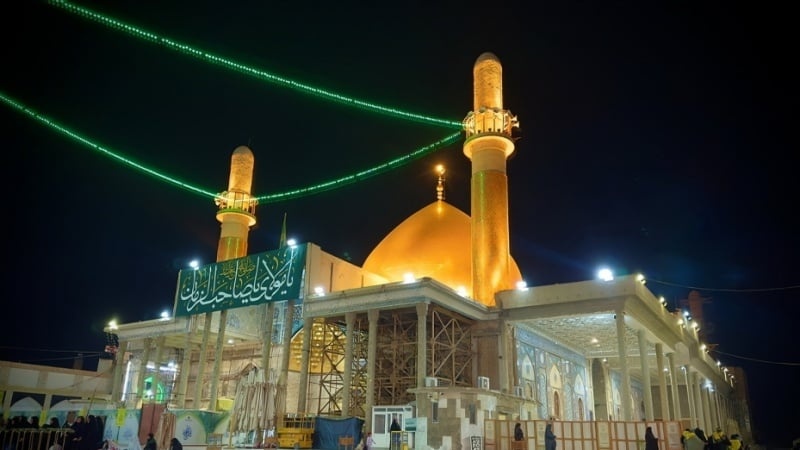What do we know about Imam Hasan al-Askari, the father of the Promised Mahdi?
-

An image of the shrine of Imam Hassan Askari in Samarra, Iraq.
Pars Today – Imam Hasan al-Askari (peace be upon him), during the briefest period of his Imamate, left behind the deepest moral messages.
Monday, 10th of Shahrivar 1404 in the Iranian calendar, corresponding to September 1, 2025, and the 8th of Rabi‘ al-Awwal 1447 in the Islamic calendar, marks the anniversary of the martyrdom of Imam Hasan al-Askari (peace be upon him), a descendant of the Prophet Muhammad (peace be upon him) and the father of Imam Mahdi (may God hasten his reappearance). This article from Pars Today looks at his biography and also references some of his hadiths.
Life
In the darkest days of Islamic history, when the oppression of the Abbasid rulers cast a heavy shadow over the hearts and faith of the people, a child was born in Medina who was destined to be a guiding light. Imam Hasan al-Askari, son of Imam al-Hadi and of the pure lineage of the Prophet Muhammad (peace be upon him), was born on the 8th or 10th of Rabi‘ al-Thani in the year 232 AH—a child whose name was associated with light and whose path was linked to awareness.
Years later, when Samarra had become a prison for the free-spirited mind, he became known by the title “al-Askari”—a title that not only recalled his enforced residence in the Askari district, but also symbolized quiet resistance and steadfastness against Abbasid tyranny. In that atmosphere of oppression, the Imam was also known by titles such as “Zaki”, “Hadi”, and “Samet”; each of these titles reflected aspects of his scholarly, moral, and spiritual character.
With the beginning of his Imamate at the age of 22, Imam Hasan al-Askari faced a government whose aim was to extinguish the flames of knowledge. Yet, with wisdom and foresight, he organized a network of deputies and representatives across the Islamic lands to deliver the message of truth to receptive hearts. In an era when speaking about religion was considered an unforgivable crime, the Imam opened a path for public awakening through profound interpretations of the Qur’an, transmitting authentic hadiths, and offering moral guidance. He not only answered questions of jurisprudence but also, through his conduct and speech, exemplified a living and conscious faith.
Alongside these efforts, the Imam’s union with Narjes Khatun, a lady from the lineage of Hazrat Shamoun, the successor of Jesus, reflected the continuation of divine light throughout history. Their son, Imam Mahdi, became a hope for a brighter future, carrying forward his father’s path in guiding and saving humanity.
Finally, on the 8th of Rabi‘ al-Awwal in 260 AH, Imam Hasan al-Askari was poisoned and martyred by Al-Mu’tamid of the Abbasid dynasty at a young age. Yet his martyrdom was not the end of his path. His shrine, beside that of his father, Imam al-Hadi, in Samarra, Iraq, is today not only a site of pilgrimage for Muslims but also a symbol of steadfastness against oppression and a call to awareness.
The following are some hadiths from Imam Hasan al-Askari (peace be upon him).
Humility
Greeting anyone you encounter and sitting in a place below your rank are signs of humility and modesty.
— Bihar al-Anwar, 78:372, Hadith 9
The Heart and Mind of the Fool and the Wise
The heart and mind of a fool are exposed through his speech, whereas the mouth of a wise person is guided by his heart; in other words, an ignorant person speaks without reflection, while a wise and prudent person speaks only after careful thought.
— Bihar al-Anwar, 78:374, Hadith 21
Inner beauty
The beauty of the face is outward beauty, and the beauty of the mind is inner beauty.
— *Bihar al-Anwar, 1:95, Hadith 27*
Superior qualities
There are two qualities above which nothing is higher: faith in God and benefiting one’s brothers.
— Bihar al-Anwar, 78:374, Hadith 26
The key to all evil
Anger is the key to every evil.
— Tuhaf al-Uqul, 488
Lying
All wickedness has been gathered in a house, and the key to it is lying.
— Jami‘ al-Akhbar, p. 418, Hadith 1162
Reflecting on the power of God
Worship is not in the abundance of fasting and prayer; rather, worship is in much reflection on the boundless power of God in all matters.
— Mustadrak al-Wasa’il, Vol. 11, p. 183, Hadith 12690